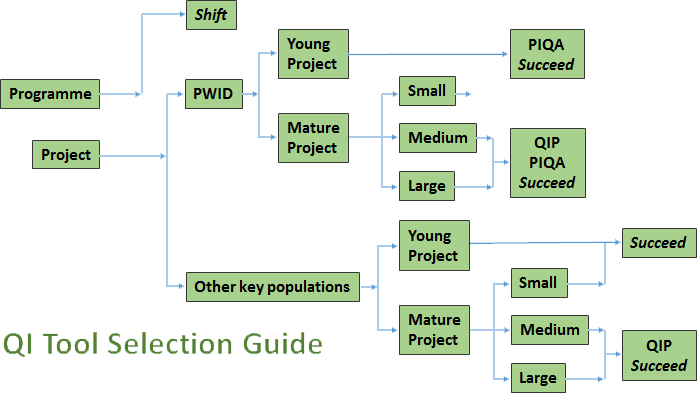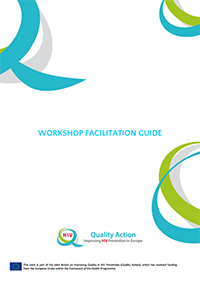
Monthly Archives: March 2016
The Quality Action policy kit
The Quality Action policy kit
Facts and recommendations for advocates and policy advisers
This policy kit has been developed for public health officials and advocates involved in policy and programming for HIV prevention and related public health challenges.
The kit contains various documents that illustrate how to systematically integrate quality improvement into HIV prevention policies and programmes, and it offers justifications and concrete actions for integrating it into HIV prevention policies, strategies and action plans.
Charter
The Charter for Quality in HIV Prevention
Committing to key principles and criteria for improving quality
The Charter states the principles and criteria for quality in HIV prevention and calls on stakeholders to support and apply quality improvement. Not only must approaches, interventions and methods for HIV prevention be appropriate to the situation they address, they must be carried out at a high level of quality to maximise effectiveness.
You can download the Charter here
This Charter was created by the representatives of Quality Action. You can support it by becoming a signatory as an organisation or as an individual.
Who’s who
Who’s who
Quality Action has trained more than 400 quality improvement trainers and facilitators from 25 different European countries. They form a network based on a culture of continuous improvement in HIV prevention, multidisciplinary collaboration and exchange of knowledge, skills, and expertise across organisations and countries. These experts can train others and provide technical assistance in a range of contexts. Find a key contact for each participating country by clicking on the map.
| Country | Contact person(s) | Organisation | Email address |
|---|---|---|---|
| Austria | Isabell Eibl (national coordinator for Quality Action) Sabine Lex (PQD expert) Sepideh Hassani (Succeed expert) |
Aids Hilfe Wien | eibl@aids-hilfe-wien.at lex@aids-hilfe-wien.at hassani@aids-hilfe-wien.at |
| Belgium | Sandra Van den Eynde | SENSOA | Sandra.vandeneynde@sensoa.be |
| Bulgaria | Georgieva Vyara | Ministry of Health | vgeorgieva@hdp.bg |
| Croatia | Jasmina Pavlic Tatjana Nemeth Blazic |
Croatian Institute of Public Health |
jasmina.pavlic@hzjz.hr tatjana.nemeth-blazic@hzjz.hr |
| Estonia | General email address |
National Institute for Health Development – Infectious Diseases and Drug Abuse Prevention Department |
nneo@tai.ee |
| Finland | Jaana Häggman | Pro-tukipiste | jaana.haggman@pro-tukipiste.fi |
| France | Stéphane Giganon Elsa Ricard |
AIDES | sgiganon@aides.org ericard@aides.org |
| Germany | Ursula von Rüden | BZgA | ursula.von-rueden@bzga.de |
| Greece | Vasileia Konte, MD Senior Expert, National Coordinator for Quality Improvement in HIV Prevention |
Hellenic Centre for Disease Control and Prevention | Konte@keelpno.gr |
| Ireland | Deirdre Seery | The Sexual Health Centre |
dseery@sexualhealthcentre.com |
| Italy | Lella Cosmaro | LILA | l.cosmaro@lilamilano.it |
| Latvia | Ruta Kaupe | NGO DIA+LOGS | ruta.kaupe@inbox.lv dialogs@diacentrs.lv |
| Lithuania | Dr. Saulius Caplinskas |
ULAC | Saulius@ulac.lt |
| Luxembourg | Laurence Mortier | Croix-Rouge luxembourgeoise |
laurence.mortier@croix-rouge.lu |
| Netherlands | Cor Blom | Soa AIDS Netherlands |
cblom@soaaids.nl |
| Poland | Aleksandra Skonieczna |
Social AIDS Committee |
office@skaids.org |
| Portugal | Daniel Simões Adriana Curado Miguel Rocha |
GAT Portugal | geral@gatportugal.org |
| Romania | Assoc. Prof. Dr. Daniela Pitigoi |
UMF Carol Davila, INBI Prof Dr Matei Bals |
danielapitigoi@yahoo.co.uk |
| Dr. Raluca Jipa | INBI Prof Dr Matei Bals |
ralucajipa@yahoo.com | |
| Monica Dan | ARAS | monicdan@gmail.com | |
| Slovakia | Danica Staneková | Slovak Medical University (SZU) |
danica.stanekova@szu.sk |
| Slovenia | Miran Solinc | Drustvo SKUC | magnus@skuc.org |
| Spain | David Paricio Salas |
SIDA STUDI | sidastudi@sidastudi.org |
| Olivia Castillo | AIDS National Strategy Ministry of Health, Social Services and Equality |
plansida@msssi.es | |
| Sweden | Lennie Lindberg | Public Health Agency of Sweden |
lennie.lindberg@folkhalsomyndigheten.se |
| Switzerland | Matthias Gnädinger |
Federal office of public health |
matthias.gnaedinger@bag.admin.ch |
| Andreas Lehner |
Swiss AIDS federation |
andreas.lehner@aids.ch | |
| United Kingdom | Anthony Nardone | Public Health England |
anthony.nardone@phe.gov.uk |
| Jabulani Chwaula |
BHA for equality in health and social care |
jabu@thebha.org.uk |
Tool selection guide
Tool selection guide
The Tool Selection Guide has been developed to support you in identifying the most suitable quality improvement tool or tools for your project or programme. The Guide first provides a brief, side by-side introduction to each of the five tools offered by Quality Action: Succeed, Shift, PIQA, PDQ and QIP. The following pages have more detailed information on each tool, listed in several categories. By comparing tools using the various categories, it is possible to identify the tool or tools most appropriate for each project or programme.
This algorithm is part of the tool selection guide and designed to guide you to the tool or tools most likely to offer you what you need. Download the full tool selection guide.

Glossary
Glossary
Get Started
Get Started
In principle, you can get started with quality improvement immediately by selecting a tool and applying it to one of your projects or programmes. In Quality Action we found that it is important to start small so that the first experience of using structured quality improvement is positive and that teams and stakeholders experience an immediate benefit from it. If your team and stakeholders are already motivated and you have a skilled facilitator, the materials provided with each of the tools offer enough guidance on how to use them.
However, we recommend introducing your team to structured quality improvement first, e.g. using the Quality Action presentation on concepts and methods of quality improvement and the Workshop Facilitation Guide. Depending on the existing skills and experience in your team, you may benefit from organising some training or technical assistance with one of the Quality Action trainers/facilitators available across Europe.
The experience of Quality Action has shown that there are six key factors that commonly influence the success of introducing structured quality improvement:
Tool Fit: selecting the most appropriate quality improvement tool, including making adaptations.
Planning and Preparation: planning structured quality improvement step by step, including preparation and follow-up as well as the actual meeting or workshop during which the tool is applied.
Participation and Involvement: selecting relevant stakeholders to take part and strategies to achieve their meaningful involvement.
Facilitation: keeping the quality improvement discussions focused as well as creative.
Available Resources: using what already exists within an organisational structure (such as meeting facilities, existing team meetings or planning cycles) to support the quality improvement process.
Additional Support: winning the personal support of line managers, funders and other relevant stakeholders as well as organising any additional resources that may be needed, such as finances for hiring a good meeting venue, reimbursing travel costs, paying an external facilitator and offering some refreshments.
Workshop Facilitation Manual
In 2014/2015, Quality Action provided training to participants from European countries in using quality improvement tools. Some of these participants then provided training to others working in HIV prevention in their countries. The Workshop Facilitation Manual aims to assist trainers in providing quality improvement workshops in their countries and organisations.
It includes a collection of plenary and small group activities that have been used successfully in previous Quality Action training workshops. They can be used in different combinations and adapted to suit different objectives and audiences.
The manual also contains sample training workshop schedules, which a number of countries have used to organise training on the tools in their countries. They may also be useful as a guide for training others within organisations.

Why focus on quality?
Why focus on quality?
We have not yet succeeded in eliminating HIV transmission; rates of HIV diagnoses remain high among key populations in the EU/EEA region.
The HIV response in the EU/EEA has not been effective enough to result in a noticeable decline over the last decade. Many factors influence the effectiveness of HIV prevention. Two important factors are: the chosen approaches, interventions and methods must be appropriate to the situation they address, and they must be carried out at a high level of quality.
For decision makers, establishing causal links in complex systems of human behaviour, quantifying sufficient program scale and distinguishing between ineffective approaches and ineffective implementation are difficult. Experts highlight implementation quality as a key factor in the effectiveness of HIV prevention.
Quality improvement aims to promote the health of the community through improvements in the quality of services, programmes and policies. It uses a defined framework in a continuous, ongoing effort to achieve measurable improvements in the efficiency, effectiveness, performance, accountability and outcomes in HIV prevention. Quality improvement is primarily about recognising and documenting what works well and why, and then building on and multiplying successes. It serves to detect, acknowledge and improve shortcomings.
The quality improvement tools available through Quality Action are based on evidence, practical experience and expert advice. They ensure that the chosen HIV prevention interventions are planned, implemented, monitored and evaluated as well as possible to maximise their effectiveness.